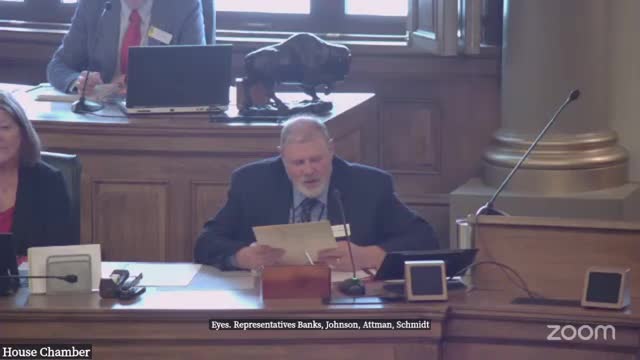House committee backs bill limiting eminent domain for private energy collector systems
Get AI-powered insights, summaries, and transcripts
Subscribe
Summary
House Bill 91 would restrict the use of eminent domain for energy collector systems across multiple private landowners, prompting debate about private property rights, constitutional challenges and unintended breadth of the bill's language.
Representative Winter moved that when the Committee of the Whole rises to report, it do so with the recommendation that House Bill 91 do pass; the motion carried and the committee recommended the bill for passage.
Representative Schmidt explained that House Bill 91 is aimed at protecting private property rights by limiting the use of eminent domain for private companies seeking easements or rights-of-way across multiple landowners. "If imminent domain takes place, that land owner...basically loses the right to his land," Schmidt said, and the bill would require negotiations to remain between private property owners and private companies without the coercive prospect of eminent domain.
Opponents raised concerns about the bill's breadth and unintended consequences. Representative Davis, who voted no in committee, asked if the language could restrict infrastructure such as natural gas, electrical lines, irrigation systems or other projects and said, "I think it has a far broader" reach than intended. Representative Connolly raised a possible constitutional challenge under Article 10, Section 9, and Representative Provenza noted an interim alternative proposal that relied on voluntary agreements by 85% of landowners and that industry associations representing livestock producers opposed the bill.
Representative Winter moved the committee recommendation; the Committee of the Whole reported House Bill 91 do pass. The committee debate shows divergence over whether the measure is tailored narrowly to problem uses or could preclude legitimate infrastructure and development; several members signaled interest in redrafting or pursuing alternative legislation that preserves broader consensus among landowners.
The bill now moves forward in the House process for further consideration; members signaled the potential for future amendments to address scope and constitutional concerns.
